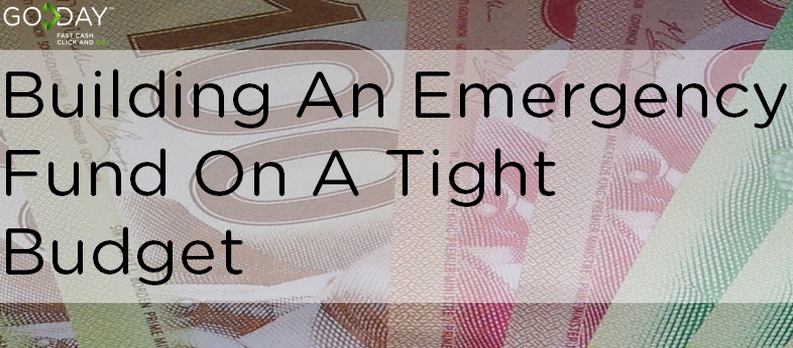 Payday Loans Online | GoDay.ca
Payday Loans Online | GoDay.ca
If you’re living paycheque to paycheque, you’re not alone – over 40% of Canadians say they would be in financial hot water if they missed their pay by a week, according to the Canadian Payroll Association. Putting aside the recommended six months of living expenses is difficult for most people, but it might seem utterly impossible for those who can’t skip a pay period. The good news is that while it might require some sacrifice and penny pinching, putting aside a rainy day fund isn’t a “when pigs fly” scenario.
First, define your savings goal.
If a six month savings is just completely unrealistic, set a smaller goal first. It really does not matter how small you start – it could be $25 a month if that’s all you can do. But trust us – when you have a solid goal in mind, and if you follow some or all of the following suggestions, you’ll see that little piggy bank grow steadily.
Set round numbers for yourself, as they’re easier to budget with and refer to on the fly. Whether you want to set aside money each paycheque, once a week, or once a month, the option is flexible to what is easiest for you. Increments of $10 are a good place to start if you want to stay very low. Bump it up to increments of $25 when you’re ready to save beyond $200. You’ll get there faster than you think.
Set up a separate bank account or save it at home.
Once you’ve decided on your goal amount and the increments you want to set, determine it’s holding location. Getting it out of your wallet is the point. Get it away from your debit card. Just get it away from where it’s too easy to reach for and spend it. Having a visual representation of your success (both saving AND watching it grow) is very helpful for many people, too! Reward yourself psychologically and you’ll end up rewarding yourself financially.
Wine after dinner? Coffee and muffins on the morning commute? Subscription to something you barely use?
Give it up for one month and squirrel that money away. We’ve done quite a few segments on giving up the daily coffee runs and how much that can save you every month, but you can apply that same discipline to other regular spending habits that can be toned down temporarily. Do you like to go to the convenience store down the street for milk instead of going to a store where you know it’s considerably less? Do you buy a new piece of clothing every month? How about a new gadget or piece of tech? Do you even read the magazines or papers you pay for subscriptions to?
Whatever it is, if you can live without it for a month or two, then do so and put that money aside for your emergency budget. You’ll probably find you can give it up for even longer. If you don’t want to give up whatever it is completely, opt for a less expensive version. Check for second-hand. Make the longer trip to the grocers. Borrow an item from a friend. If there’s a will, there truly is a way.
Now is a good time to give up a bad habit.
We definitely can stand behind any behaviour that makes you a healthier and happier person. If your habit isn’t that great for you AND it costs you money, maybe the goal of having an emergency budget is a great time to give it up. If you smoke, just imagine how much cash you’d save every month! How’s the alcohol consumption? Fast-food? We’re not here to judge or point fingers, but we do want you to think critically about where you’re spending your money, and if that spending is hurting not only your wallet, but your body too!
Save your change!
One of our own did this for a month to test out how much of a difference putting change aside really made. After 30 days of putting every coin minus a loonie into a jar, she had saved almost $40. The beautiful part about having $1 and $2 coins in Canada is that you really can throw a huge chunk into a savings pot without realizing. It adds up fast.
Eat simply for a month
Diversity in food is what keeps your grocery bill high. It is nice to mix it up, but if you’re serious about putting money aside for an emergency, then re-consider the items on your grocery list. Eating the same thing even for one meal a day can cut your food bill by 10%. Worth it? Absolutely.
Have a tip that we might have missed? We’d love to hear it (and to share the wealth of info with others!). Sound off in the comments or let us know on Facebook or Twitter.


